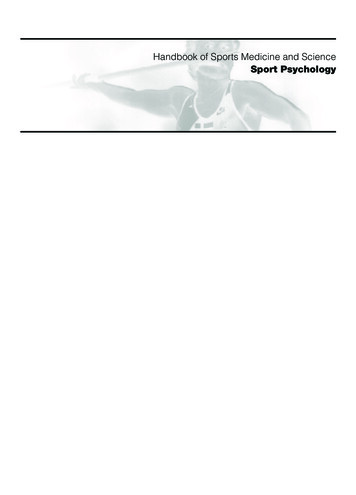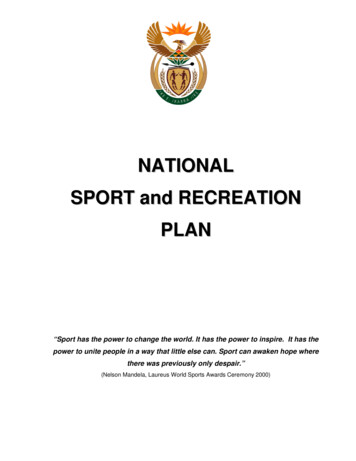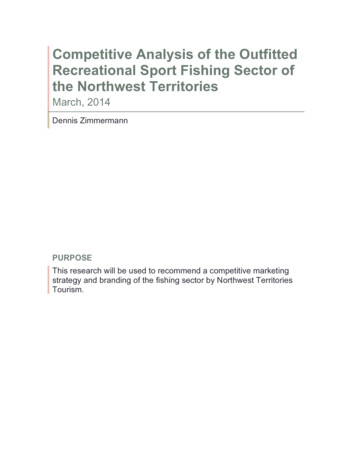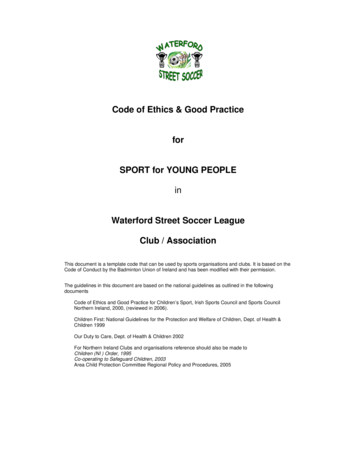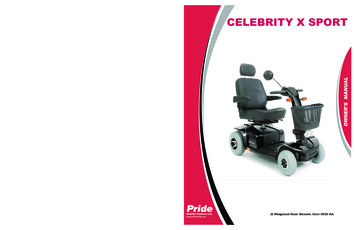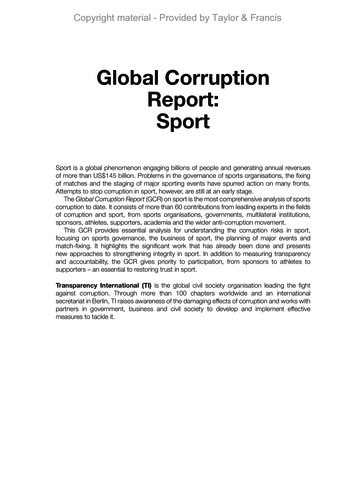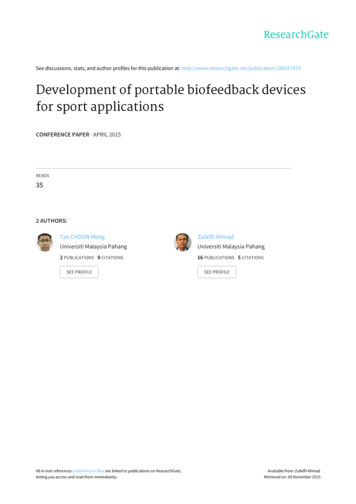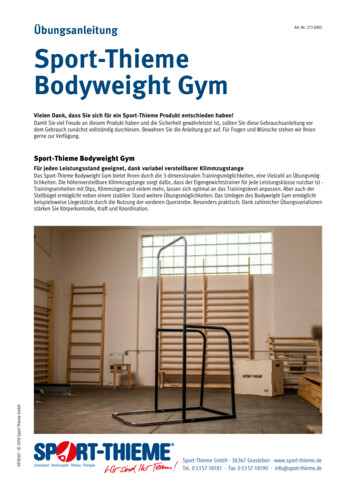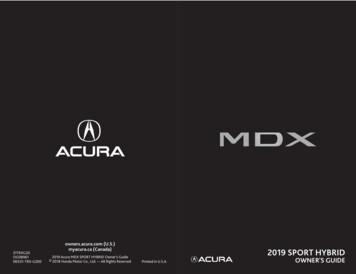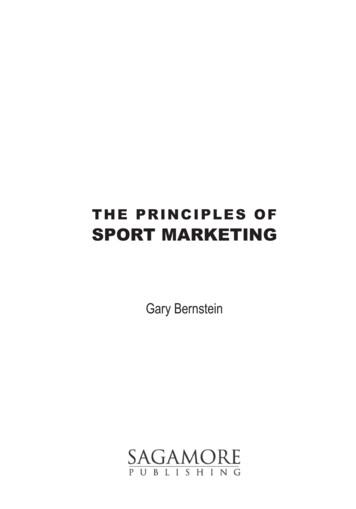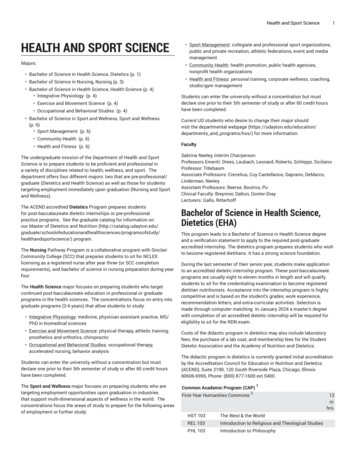
Transcription
Health and Sport ScienceHEALTH AND SPORT SCIENCEMajors: Bachelor of Science in Health Science, Dietetics (p. 1) Bachelor of Science in Nursing, Nursing (p. 3) Bachelor of Science in Health Science, Health Science (p. 4) Integrative Physiology (p. 4) Exercise and Movement Science (p. 4) Occupational and Behavioral Studies (p. 4) Bachelor of Science in Sport and Wellness, Sport and Wellness(p. 6) Sport Management (p. 6) Community Health (p. 6) Health and Fitness (p. 6)The undergraduate mission of the Department of Health and SportScience is to prepare students to be proficient and professional ina variety of disciplines related to health, wellness, and sport. Thedepartment offers four different majors: two that are pre-professional/graduate (Dietetics and Health Science) as well as those for studentstargeting employment immediately upon graduation (Nursing and Sportand Wellness).The ACEND accredited Dietetics Program prepares studentsfor post-baccalaureate dietetic internships or pre-professionalpractice programs. See the graduate catalog for information onour Master of Dietetics and Nutrition rtscience/) program.The Nursing Pathway Program is a collaborative program with SinclairCommunity College (SCC) that prepares students to sit for NCLEXlicensing as a registered nurse after year three (or SCC completionrequirements), and bachelor of science in nursing preparation during yearfour.The Health Science major focuses on preparing students who targetcontinued post-baccalaureate education in professional or graduateprograms in the health sciences. The concentrations focus on entry intograduate programs (2-4 years) that allow students to study: Integrative Physiology: medicine, physician assistant practice, MS/PhD in biomedical sciences Exercise and Movement Science: physical therapy, athletic training,prosthetics and orthotics, chiropractic Occupational and Behavioral Studies: occupational therapy,accelerated nursing, behavior analysisStudents can enter the university without a concentration but mustdeclare one prior to their 5th semester of study or after 60 credit hourshave been completed.The Sport and Wellness major focuses on preparing students who aretargeting employment opportunities upon graduation in industriesthat support multi-dimensional aspects of wellness in the world. Theconcentrations focus the areas of study to prepare for the following areasof employment or further study:1 Sport Management: collegiate and professional sport organizations,public and private recreation, athletic federations, event and mediamanagement Community Health: health promotion, public health agencies,nonprofit health organizations Health and Fitness: personal training, corporate wellness, coaching,studio/gym managementStudents can enter the university without a concentration but mustdeclare one prior to their 5th semester of study or after 60 credit hourshave been completed.Current UD students who desire to change their major shouldvisit the departmental webpage (https://udayton.edu/education/departments and programs/hss/) for more information.FacultySabrina Neeley, Interim ChairpersonProfessors Emeriti: Drees, Laubach, Leonard, Roberts, Schleppi, SicilianoProfessor: TitlebaumAssociate Professors: Crecelius, Cuy Castellanos, Daprano, DeMarco,Linderman, NeeleyAssistant Professors: Beerse, Boutros, PuClinical Faculty: Breymier, Dalton, Gonter-DrayLecturers: Gallo, RitterhoffBachelor of Science in Health Science,Dietetics (EHA)This program leads to a Bachelor of Science in Health Science degreeand a verification statement to apply to the required post-graduateaccredited internship. The dietetics program prepares students who wishto become registered dietitians. It has a strong science foundation.During the last semester of their senior year, students make applicationto an accredited dietetic internship program. These post-baccalaureateprograms are usually eight to eleven months in length and will qualifystudents to sit for the credentialing examination to become registereddietitian nutritionists. Acceptance into the internship program is highlycompetitive and is based on the student's grades, work experience,recommendation letters, and extra-curricular activities. Selection ismade through computer matching. In January 2024 a master’s degreewith completion of an accredited dietetic internship will be required foreligibility to sit for the RDN exam.Costs of the didactic program in dietetics may also include laboratoryfees, the purchase of a lab coat, and membership fees for the StudentDietetic Association and the Academy of Nutrition and Dietetics.The didactic program in dietetics is currently granted initial accreditationby the Accreditation Council for Education in Nutrition and Dietetics(ACEND), Suite 2190, 120 South Riverside Plaza, Chicago, Illinois60606-6995, Phone: (800) 877-1600 ext 5400.Common Academic Program (CAP)First-Year Humanities Commons12HST 103The West & the WorldREL 103Introduction to Religious and Theological StudiesPHL 103Introduction to Philosophy12cr.hrs.
2Health and Sport ScienceENG 100Writing Seminar ISecond-Year Writing SeminarENG 2008340-3cr.hrs.Writing Seminar IIOral CommunicationCMM 1003cr.hrs.Principles of Oral CommunicationMathematicsSSC 200Natural Sciences5Crossing BoundariesMajor RequirementsIntroduction to Accounting (Satisfies CAP Inquiry)3BIO 151Concepts of Biology I: Cellular & Molecular Biology3BIO 152Concepts of Biology II: Evolution & Ecology33cr.hrs.BIO 312General Genetics3BIO 411General Microbiology3CHM 123& 123LGeneral Chemistryand General Chemistry Laboratory43cr.hrs.CHM 124& 124LGeneral Chemistryand General Chemistry Laboratory4CHM 313Organic Chemistry37cr.hrs.ENG 370Report & Proposal Writing3Social Science IntegratedArtsThe course or experience is designed by faculty in each major; it may,or may not, be assigned credit hours.ACC 2003cr.hrs.Social Science9May not double count with First-Year Humanities Commons, SecondYear Writing, Oral Communication, Social Science, Arts, or NaturalSciences CAP components, but may double count with coursestaken to satisfy other CAP components and/or courses taken in thestudent's major.upto12cr.hrs.or ENG 371Technical Communicationor ENG 372Business and Professional Writingor ENG 373Writing in the Health Professionsor ENG 366Health Literacy and Social JusticeHSS 101Introduction to the University Experience1HSS 113Introduction to Dietetics & Nutrition2Faith TraditionsHSS 201Medical Terminology2Practical Ethical ActionHSS 210& 210LIntroductory Foodsand Introductory Foods Laboratory4IntegrativeHSS 295Nutrition & Health (Satisfies CAP Integrative)3Advanced StudyHSS 302Community Nutrition (Satisfies CAP Diversity andSocial Justice)3HSS 303Food Service Systems Management23cr.hrs.HSS 304Institutional Quantity Food Buying3HSS 305Human Anatomy3HSS 305LHuman Anatomy Laboratory10-6cr.hrs.HSS 307Human Physiology3HSS 395Nutrition through the Lifecycle3HSS 401Nutritional Biochemistry I3The credit hours listed reflect what is needed to complete each CAPcomponent. However, they should not be viewed as a cumulativeaddition to a student's degree requirements because many CAPcourses are designed to satisfy more than one CAP component (e.g.,Crossing Boundaries and Advanced Studies) and may also satisfyrequirements in the student's major.HSS 428Research in Sport and Health Sciences (SatisfiesCAP Capstone)3HSS 439Professional Seminar in Dietetics2HSS 456Nutritional Biochemistry II3HSS 494Assessment of Nutritional Status3May be completed with ASI 110 and ASI 120 through the CoreProgram.HSS 495Medical Nutrition Therapy I3HSS 496Medical Nutrition Therapy II3MGT 300Survey of Organizational Behavior3Inquiry6Philosophy and/or Religious Studies (6 cr. hrs.)Historical Studies (3 cr. hrs.)Diversity and Social JusticeMajor Capstone1234567789May be completed with ENG 100A and ENG 100B, by placement.May be completed with ENG 114 or ENG 198 or ASI 120.Must include two different disciplines and at least one accompanyinglab.U.S. History AP and CLEP credit will not satisfy this requirement.May be completed with ASI 110 and ASI 120 through the CoreProgram. U.S. History AP and CLEP credit will not satisfy thisrequirement.or HSS 356Organizational Behavior in Health & SportMTH 207Introduction to Statistics (Satisfies CAPMathematics)3PSY 101Introductory Psychology3PSY 431Interviewing & Counseling3PHL 313Business Ethics (Satisfies CAP Practical EthicalAction )3
Health and Sport Scienceor PHL 315Medical Ethicsor REL 367Christian Ethics & Health Care IssuesOral Communicationor REL 368Christian Ethics & the Business WorldCAP Arts Elective3CAP Adv. HST ElectiveCMM 1003cr.hrs.Principles of Oral CommunicationMathematics3cr.hrs.Social Science3cr.hrs.CAP Faith Traditions/ADV RELBachelor of Science in Nursing, Nursing(NSG)The University of Dayton Nursing Program prepares students topractice as Baccalaureate generalist nurses through a rigorous andtransformative liberal arts and sciences curriculum in concert withnursing courses that are in alignment with the American Associationof Colleges of Nursing Essentials for Baccalaureate Education forProfessional Nursing Practice. The program is a Pathway program incollaboration with Sinclair Community College where students completetheir first year at UD; second and third year students are dually enrolled atUD and Sinclair, then upon successful completion of the Sinclair nursingprogram and passing NCLEX (RN licensure) after year three, students willcomplete year 4 at UD while transitioning to practice as licensed RN's.SSC 200Natural SciencesInquiryGoal 6: Combine skills learned regarding evidence-based practice,information literacy, research, and healthcare informatics to advocatefor and provide quality care to multiple patient populations across thelifespan.Philosophy and/or Religious Studies (6 cr. hrs.)Historical Studies (3 cr. hrs.)Diversity and Social JusticeMajor Capstone1Introduction to PhilosophyENG 100Writing Seminar IENG 2003412cr.hrs.PHL 103Second-Year Writing Seminar21Introduction to Religious and Theological StudiesWriting Seminar II5678346Advanced StudyGoal 5: Demonstrate customer service to stakeholders within the nursingprofession through professional competence and ethical behaviors.REL 103upto12cr.hrs.IntegrativeGoal 4: Choose appropriate communication styles and venues thatwill enhance interdisciplinary collaboration and patient-centered careincorporating the principles surrounding organizational environments andmanagement.The West & the World7cr.hrs.Practical Ethical ActionGoal 3: Evaluate policies related to healthcare in terms of finance,regulations, and community/public health through the use of professionalcompetence and values.HST 1035Faith TraditionsGoal 2: Use clinical reasoning to enhance nursing practice byunderstanding appropriate application and dissemination of EvidenceBased research and practice.23cr.hrs.Crossing BoundariesGoal 1: Apply critical thinking skills to leadership roles in order toimprove patient safety and quality of care by utilizing interdisciplinarycommunication skills.First-Year Humanities CommonsSocial Science IntegratedArtsUniversity of Dayton BSN program learning goals are:Common Academic Program (CAP)30-3cr.hrs.7893cr.hrs.0-6cr.hrs.The credit hours listed reflect what is needed to complete each CAPcomponent. However, they should not be viewed as a cumulativeaddition to a student's degree requirements because many CAPcourses are designed to satisfy more than one CAP component (e.g.,Crossing Boundaries and Advanced Studies) and may also satisfyrequirements in the student's major.May be completed with ASI 110 and ASI 120 through the CoreProgram.May be completed with ENG 100A and ENG 100B, by placement.May be completed with ENG 114 or ENG 198 or ASI 120.Must include two different disciplines and at least one accompanyinglab.U.S. History AP and CLEP credit will not satisfy this requirement.May be completed with ASI 110 and ASI 120 through the CoreProgram. U.S. History AP and CLEP credit will not satisfy thisrequirement.May not double count with First-Year Humanities Commons, SecondYear Writing, Oral Communication, Social Science, Arts, or NaturalSciences CAP components, but may double count with coursestaken to satisfy other CAP components and/or courses taken in thestudent's major.
49Health and Sport ScienceThe course or experience is designed by faculty in each major; it may,or may not, be assigned credit hours.Common Academic Program (CAP)First-Year Humanities Commons1212cr.hrs.Major RequirementsREL 103Introduction to Religious and Theological Studies3MTH 207Introduction to Statistics3CHM 101Introductory General, Organic, and Biochemistry I3CHM 101LIntroductory General, Organic, and BiochemistryLaboratory I1HST 103The West & the World3PHL 103Introduction to Philosophy3HSS 101Introduction to the University Experience1HSS 197Introduction to Healthcare Delivery3HSS 202Healthcare Professionalism and ContemporaryIssues Seminar I1HSS 203Healthcare Professionalism and ContemporaryIssues Seminar II1SSC 200Social Science Integrated3HSS 301Healthcare Professionalism and ContemporaryIssues Seminar III1HSS 428Research in Sport and Health Sciences3HST 355American Urban History3MUS/REL 352Understanding Sacred Music & Worship in theLocal Church3NSG 401Professional Roles and Standards3NSG 402Interdisciplinary Health Assessment3NSG 404Nursing Informatics and Technology3NSG 405Systems Based Leadership for Nursing3NSG 406Activism and Advocacy for Nursing3NSG 407Population Based Health for Nursing3NSG 408RN-BSN Practicum Project3CAP Arts ElectiveEDT 305HST 103The West & the WorldREL 103Introduction to Religious and Theological StudiesPHL 103Introduction to PhilosophyENG 100Writing Seminar ISecond-Year Writing SeminarENG 200340-3cr.hrs.Writing Seminar IIOral CommunicationCMM 1003cr.hrs.Principles of Oral CommunicationMathematics3cr.hrs.Social Science3cr.hrs.SSC 200Social Science IntegratedArtsNatural Sciences3cr.hrs.57cr.hrs.Crossing Boundariesupto12cr.hrs.3Philosophy and History of American EducationSinclair Coursework3Faith Traditions42Bachelor of Science in Health Science,Health Science (HSC)The focus of the major in Health Science , with its multipleconcentrations: Integrative Physiology, Exercise and Movement Sciences,and Occupational and Behavioral Studies will be to build upon theCommon Academic Program to create graduates who can:# Demonstrate an understanding of the scientific foundations of healthrelated disciplines;# Demonstrate an appreciation and commitment to physical activitypractice and sociocultural factors that influence this practice; and# Develop professionally and identify relevant professional goals andnecessary action steps.Specifically, this program serves a significant disciplinary purpose bypreparing students primarily for continued study in high demand rapidlygrowing graduate health professional schools. Given some studentsmay not matriculate to graduate health programs, this program will alsoprovide sufficient preparation for select entry-level career options inhealth related industries.Practical Ethical ActionInquiry6IntegrativeAdvanced StudyPhilosophy and/or Religious Studies (6 cr. hrs.)Historical Studies (3 cr. hrs.)Diversity and Social JusticeMajor Capstone1237893cr.hrs.0-6cr.hrs.The credit hours listed reflect what is needed to complete each CAPcomponent. However, they should not be viewed as a cumulativeaddition to a student's degree requirements because many CAPcourses are designed to satisfy more than one CAP component (e.g.,Crossing Boundaries and Advanced Studies) and may also satisfyrequirements in the student's major.May be completed with ASI 110 and ASI 120 through the CoreProgram.May be completed with ENG 100A and ENG 100B, by placement.
Health and Sport Science4567891May be completed with ENG 114 or ENG 198 or ASI 120.Must include two different disciplines and at least one accompanyinglab.U.S. History AP and CLEP credit will not satisfy this requirement.May be completed with ASI 110 and ASI 120 through the CoreProgram. U.S. History AP and CLEP credit will not satisfy thisrequirement.25Students interested in a Psychology minor should take the 2semester sequenceAbnormal Psychology is preferred for Exercise and MovementScience and Occupational and Behavioral StudiesPLUS Concentration Area ( Integrative Physiology (p. 5), Exercise &Movement Science (p. 5), Occupational & Behavioral Studies (p. 6))May not double count with First-Year Humanities Commons, SecondYear Writing, Oral Communication, Social Science, Arts, or NaturalSciences CAP components, but may double count with coursestaken to satisfy other CAP components and/or courses taken in thestudent's major.The course or experience is designed by faculty in each major; it may,or may not, be assigned credit hours.Health and Sport Science CoreMust have minimum major GPA 2.0Integrative Physiology Concentration(IPH)Building upon the learning outcomes of the Health Science major, theIntegrative Physiology concentration seeks to prepare graduates that areable to: Demonstrate advanced knowledge of physical, chemical andbiological sciences, including subdisciplines. Identify core concepts in physiology and describe how they relate tohuman health and disease.HSS 101Introduction to the University Experience1HSS 114Introduction to Health Professions2HSS 201Medical Terminology2HSS 295Nutrition & Health3HSS 305& 305LHuman Anatomyand Human Anatomy Laboratory4HSS 307& 307LHuman Physiologyand Physiology Laboratory4Targeted destinations for graduates are graduate programs (medicine,physician assistant, biosciences, health sciences) and employment(clinical research, medical sales, and corporate wellness).HSS 408& 408LPhysiology of Exerciseand Physiology of Exercise Laboratory4Health and Sport ScienceHSS 428Research in Sport and Health Sciences3Mathematics and Natural Sciences Demonstrate extensive knowledge of human anatomy, physiology,and applied physiology. Understand and utilize research design and techniques with specificattention to implications on human health and disease.HSS 346Clinical Assessment and Electrocardiography3HSS 488Special Topics in Health and Sport Science3or HSS 497Advanced Experimental Methods in Health ScienceMTH 207Introduction to Statistics3Mathematics and Natural SciencesBIO 151& 151LConcepts of Biology I: Cellular & Molecular Biologyand Concepts of Biology Laboratory I: Cellular &Molecular Biology4MTH 148Introductory Calculus I3Concepts of Biology II: Evolution & Ecologyand Concepts of Biology Laboratory II: Evolution &Ecology4College Physics Iand College Physics Laboratory I4BIO 152& 152LPHY 201& 201LPHY 202& 202LCollege Physics IIand General Physics Laboratory4CHM 123& 123LGeneral Chemistryand General Chemistry Laboratory4BIO 312General Genetics3General Chemistryand General Chemistry Laboratory4Organic Chemistryand Organic Chemistry Laboratory4CHM 124& 124LCHM 313& 313LCHM 314& 314LOrganic Chemistryand Organic Chemistry Laboratory4Introductory Psychology3CHM 420Biochemistry3BIO 411General MicrobiologyPsychologyPSY 101PSY 251 or (PSY 351 and PSY 353)1Upper-Level Psychology PSY 3/4XX23or6Professional SkillsENG 373or ENG 366HSS 465Writing in the Health Professions313 Demonstrate advanced knowledge of physical and biologicalsciencesEthics for Health ProfessionalsPHL 315or REL 367Medical EthicsChristian Ethics & Health Care Issues Concentration RequirementsExercise and Movement ScienceConcentration (EXM)Building upon the learning outcomes of the Health Science major,the Exercise and Movement Science concentration seeks to preparegraduates who are able to:Health Literacy and Social JusticeHealth Science SeminarAdditional Laboratory (BIO or CHM)Typically BIO 411L or CHM 420L Demonstrate comprehensive knowledge of human anatomy,physiology, and applied physiology.31
6Health and Sport Science Understand and utilize
healthandsportscience/) program. The Nursing Pathway Program is a collaborative program with Sinclair Community College (SCC) that prepares students to sit for NCLEX licensing as a registered nurse after year three (or SCC completion requirements), and bachelor of science in nursing
